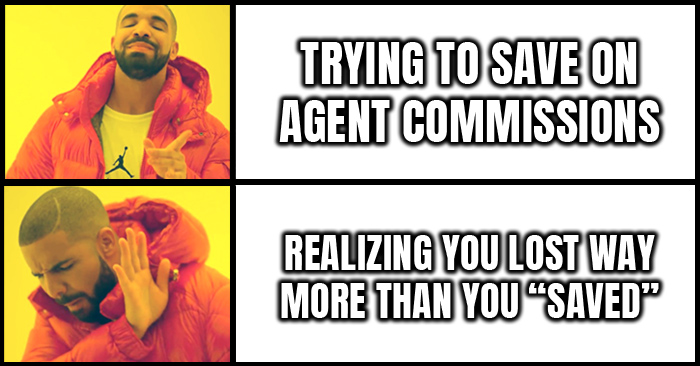A lot of people think that the Internet has made it so much easier to sell a house, and have a difficult time understanding why they should still hire a real estate agent and pay them commissions.
It’s understandable when you only consider the aspects of selling a house that boil down to buyers and sellers finding each other. The internet has certainly made that part simpler.
There are plenty of ways for sellers to use the internet to make it known that their house is for sale to potential buyers, without having to rely on real estate agents and their access to the multiple listing services.
In fact, there are even buyers who use the internet to make it known that they’re in the market to purchase houses, and offer to buy from sellers directly in order to make it a quick, easy, and less costly process by cutting out the need for agents.
So, with the internet creating such an efficient marketplace, why should a seller bother hiring an agent?
Well, because it could end up costing you more than you think you’ll be saving…
55,000 Examples of Sellers Who Lost Money
The Federal Trade Commission (FTC) recently came to the rescue of 55,000 home sellers who were misled by an online home buying company called Opendoor Technologies. The company promised sellers that their cutting-edge technology would save them money, by offering to directly pay them “market value” for their home, and cutting out the costs (such as commissions) involved with the traditional home sales process involving agents.
“Rescue” might be a strong word, though. Because, according to this MSN article, the FTC will only refund about $1,000 to sellers who are even eligible to receive a portion of the $62 million dollars the company was fined. That’s likely a drop in the bucket compared to how much most of those sellers actually cost themselves by selling to Opendoor. The FTC said, “In reality, most people who sold to Opendoor made thousands of dollars less than they would have by selling their homes using the traditional process.”
According to the FTC findings, here are two ways selling to Opendoor either cost, or lost sellers money:
- Sellers were misled about the true market value of their homes and convinced to sell for less than they could have sold their house for on the open market.
- Sellers ended up paying more in costs to Opendoor than sellers typically pay to work with real estate agents.
In order for companies like Opendoor to make money, they have to offer below market value for a home. According to Tomasz Piskorski, a professor at Columbia Business School who has done research on this type of business model, on average they buy homes at a 3.6% discount compared to what sellers would get by selling their home through the traditional process.
It’s difficult to say how much each seller paid in fees in the past, but Opendoor is still in business, and here are some of the costs and fees they publish on their website:
- A “service fee” of 5% on every home they buy, which they literally say is “similar to how commission works for real estate agents.” This is Interesting, considering they positioned themselves as a way to avoid the cost of real estate agents…
- They also may deduct “repair costs” for anticipated repairs, so sellers don’t have to pay cash up front to sell their home. This is a slippery slope, because they are “anticipating” what could be wrong with the house, not necessarily basing it upon an in-person inspection by a licensed inspector.
Considering how much homes are typically worth, $1,000 probably isn’t going to help most of those sellers recoup anywhere near the amount of money they lost. It doesn’t even come close to making up for the loss of wealth those sellers should have after selling an asset that often accounts for much of a person’s net worth. Sadly, in most cases, the decision was likely made in hopes of walking away with more net worth by eliminating the cost of real estate agent commissions.
No matter how easy it may seem to sell and buy houses due to technological advances, there’s a lot more to getting the best results possible. So, if you find yourself questioning whether it makes sense to hire a real estate agent and pay a commission, just think about the 55,000 home sellers affected by this one company. While they probably all felt like they were going to come out ahead by avoiding agents, now they’d probably all gladly turn back time, hire an agent, and willingly pay a commission.
The Takeaway:
It may seem appealing to avoid paying real estate commissions, especially since technology has seemingly made it easier to sell your home directly to a buyer. However, without the help of an agent who knows market values, and has the skills to get you the most for your house, it’s easy to lose more money than their representation would’ve cost you.

